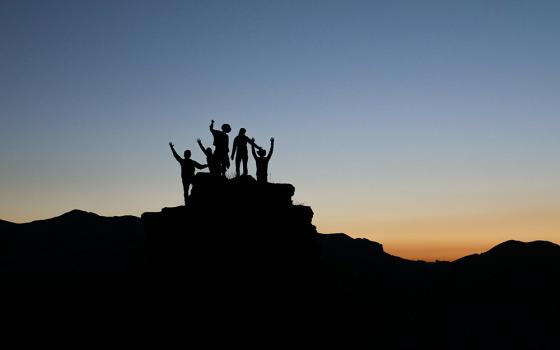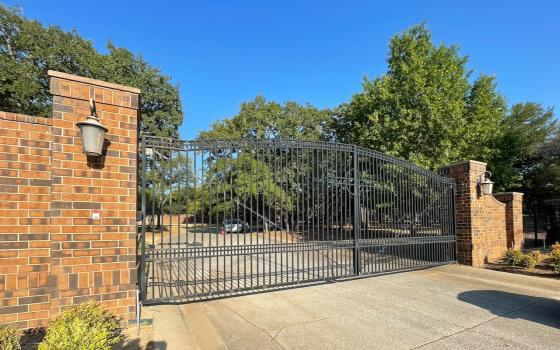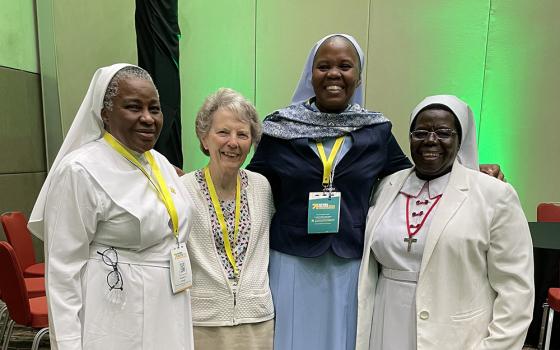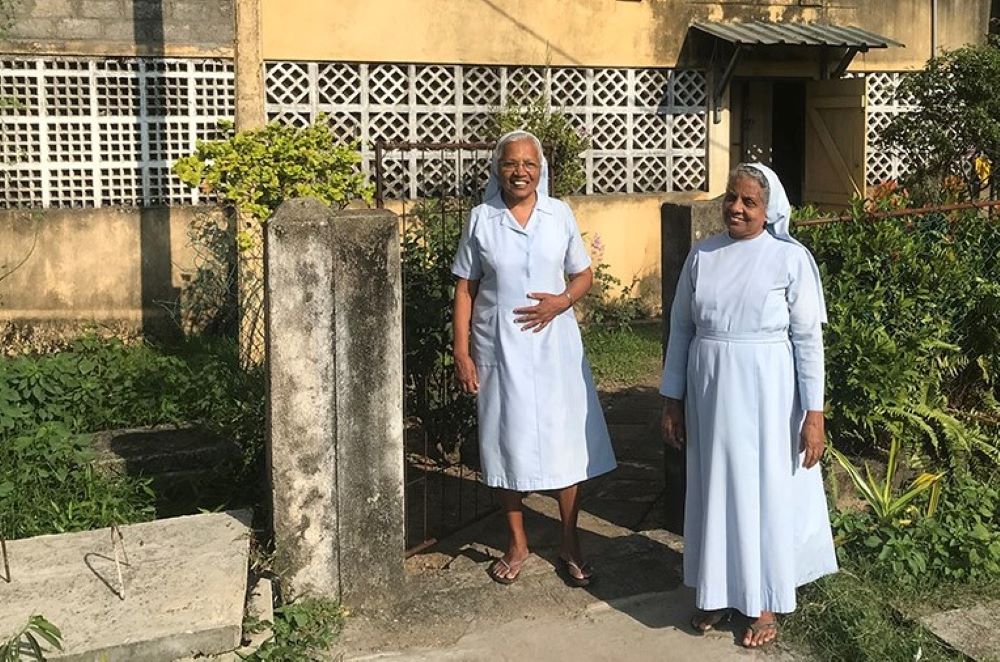
Salvatorian Srs. Rani Fernando, left, and Selvarani Fernando (no relation) stand outside their apartment in Don Boscopura, a tsunami rehabilitation enclave in Negombo, Sri Lanka. (Thomas Scaria)
Sr. Rani Fernando works among tsunami victims, aided by the Catholic Church in Negombo, a Christian stronghold in the southwestern coast of Sri Lanka. The 73-year-old nun and other three members of the Sisters of the Divine Savior stay in Don Boscopura, a colony for people displaced by the Dec. 26, 2004, tsunami, as part of their policy of being with people where they are.
The tsunami killed more than 30,000 people and displaced almost 1 million in Sri Lanka. An estimated 150,000 people lost their primary source of livelihood. The tsunami rehabilitation project was started by the Salesians in 2005 and later handed over to St. Sebastian's Church in Negombo.
Taking up the Don Boscopura project was part of the Salvatorians' transition in mission that encouraged their nuns to stay with the people as one among them instead of building convents around them.
Fernando, who has worked with the fisherfolk residing in Don Boscopura for nearly a decade, shared with Global Sisters Report the successes and failures of her challenging mission.
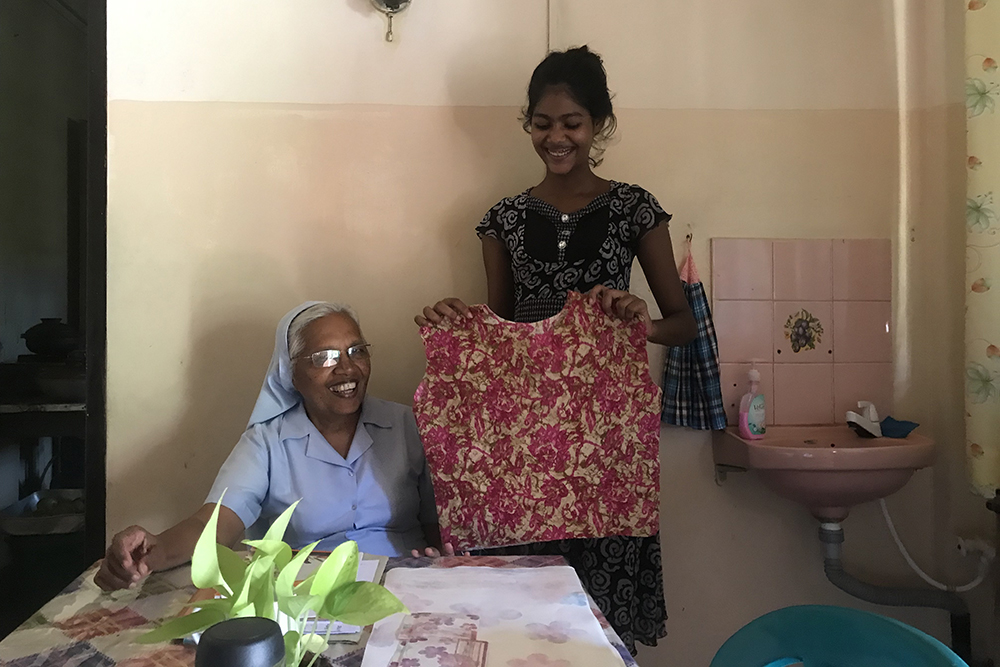
Danisha Ravihansi, right, shows her first tailoring product to Sr. Rani Fernando. The Salvatorian sisters teach embroidery, stitching and tailoring to children in Don Boscopura, Negombo, Sri Lanka. (Thomas Scaria)
GSR: How did you start your mission among tsunami victims?
Fernando: When the tsunami hit the Sri Lankan coast, I was in Rome, serving on our general council, and my superior general sent me back to Sri Lanka to help tsunami victims. The Salvatorians in other countries collected money, and we started building homes for those who lost everything in the killer waves. We had one sister whose entire family was washed away in Mullaitivu District in northern Sri Lanka.
We worked passionately in the tsunami rehabilitation programs with our limited resources. However, we could only build some 20 homes for tsunami victims in those days, which continued as a special mission of our congregation in Sri Lanka covering not only tsunami victims, but also war victims.
What motivated you to take up the Boscopura mission?
One of the main thrusts of our provincial chapter in 2012 was to reach out to people in their own places, live in their situations, and witness Christ. This has challenged us to come out of our comfort zones of the convent and live with the people.
I was the provincial then and took the initiative to move to one of the apartments in Boscopura in 2013 with two other sisters. We took up the mission among rehabilitated fishermen in response to an invitation from the parish priest of St. Sebastian's Church on Sea Street in Negombo. We took over from the Salesian sisters who visited the community from their convent until 2010.
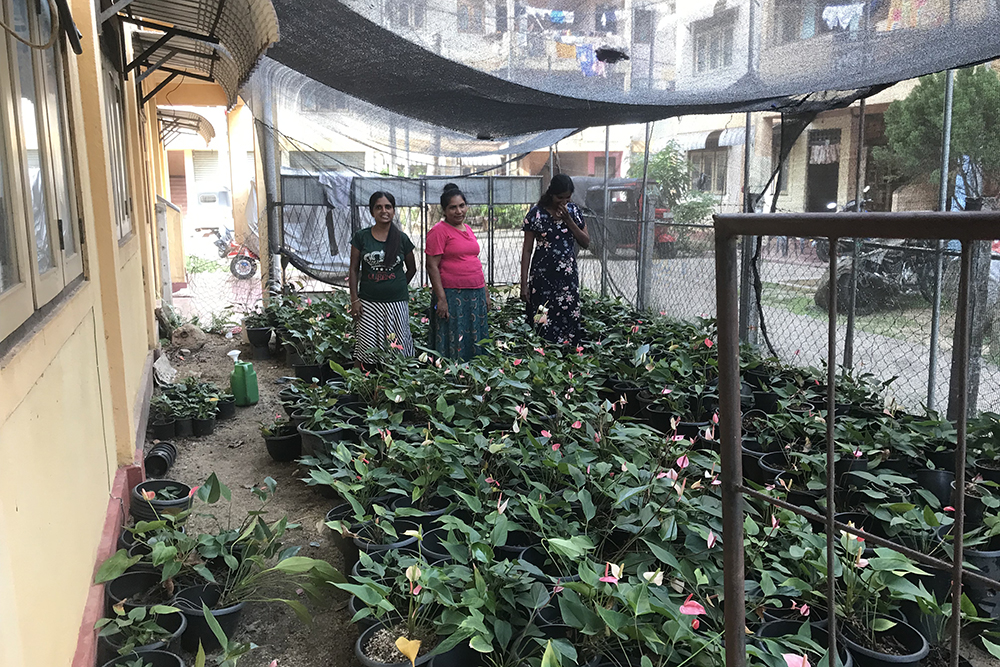
Female members of the Salesians' self-help groups engage in orchid cultivation in Don Boscopura, Negombo, Sri Lanka. (Thomas Scaria).
How challenging were your initial days at Boscopura, and how did you manage them?
We were given a ground-floor apartment that was used as the office premises for Boscopura. In the initial days, we visited all 206 houses in the village and prepared a feasibility report for the mission and shared it with all our Salvatorian communities in Sri Lanka before officially starting our mission there.
What were the findings in the study?
One shocking fact was that most of the original families who were allotted houses as part of tsunami rehabilitation were not there at all. They had sold the flats and gone back to the sea, saying their occupation was fishing and they had to be near the sea. Though the policy did not allow selling the flats, the Don Bosco management, which still owns the project, silently permitted them on account of their livelihood.
Another challenge was that most families there were poor with no specific jobs, income or social life. Many young people depended on menial jobs connected to tourism in Negombo's beaches, including drug trafficking and drug use, giving Boscopura a bad name. The people living there faced social stigma, leading to their social boycotts. No one wanted to marry girls from Boscopura or send girls there. We realized it would be tough to be with the community, but we took it as a challenge. We are still there, even after 10 years.
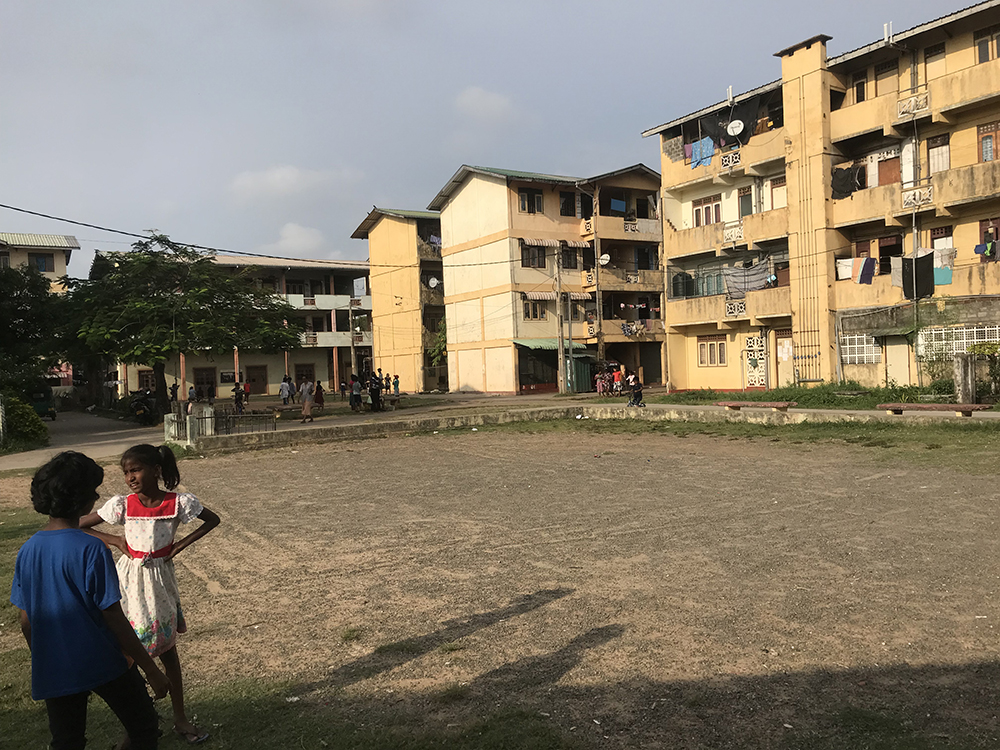
A view of the apartments built by the Salesians in 2005 to rehabilitate tsunami victims in Negombo, Sri Lanka (Thomas Scaria)
What have you achieved so far in the mission among them?
The biggest achievement is that we are still with them. We did not reject them, nor did they abandon us. Our focus was for children, specifically, with a vision for their future. Our sisters keep them together by giving tuition, moral education and catechism and engaging them in various activities. The community liked this service, and their parents gradually started coming to us. If they don't come, we visit them in their homes and discuss their children. This way, we build up their confidence. This is predominantly a Catholic community with a few Buddhist and Muslim families.
How did you address children's educational needs?
We don't own a school here but run a tuition center and send the children to a nearby government school. We also prepare tiffin [a light meal] for children to encourage them to attend the school. We prepare about 100 such meal packets daily. Our congregation supports this project. We also organize sports, cultural competitions and other programs for the children that bring their families together. Now, even the youth get attracted to our work in the community.
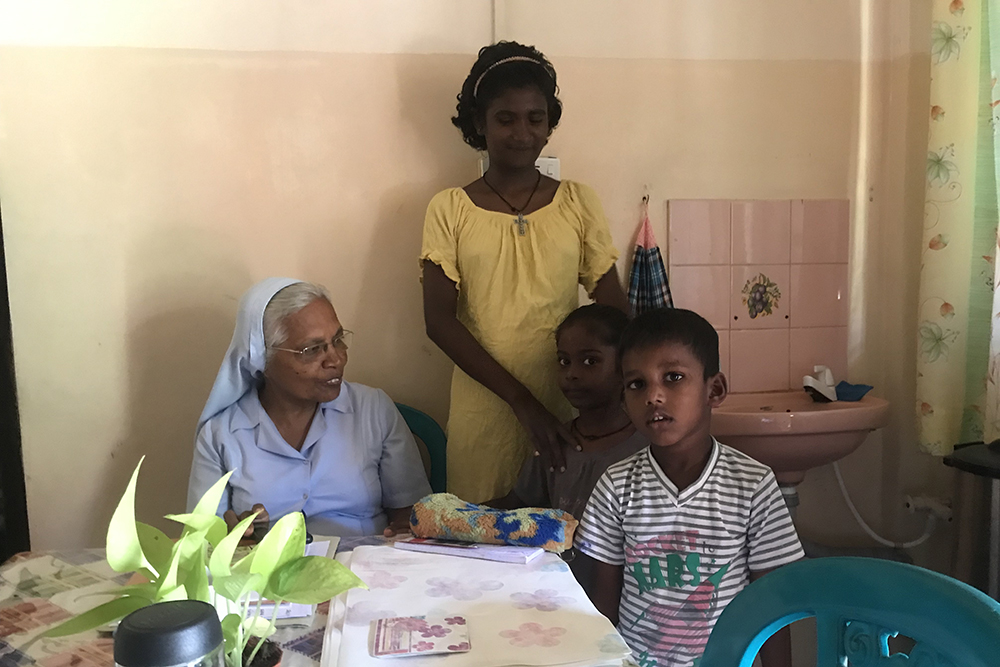
Salvatorian Sr. Rani Fernando with children of the Don Boscopura neighborhood who came to greet her before starting a tuition class in Negombo, Sri Lanka (Thomas Scaria)
How about the women?
When the children go to school, we spend time with the women. We have initiated self-help groups for them with sustainable programs. Preparing flower plants for sale, tailoring, marketing fish products were some of the common programs we promoted among women. Sometimes, we accompany them to the seashore, where they sell fish or process dry fish. Now, the women have joined together to address the drug problem among the youth.
Are you disappointed at the slow progress of your mission?
We have several challenges, but I feel this is our mission. We should not be driven by what we should do for the people, but what people want from us. We should be willing to accept failure. Everything may not work according to our plans. Boscopura has shown us our mission could fail, but it taught us some lessons.
The church's traditional approach to crisis management was the need of the hour, but it did not bring the desired effect. The tsunami affected people who were mostly fishermen who wanted to return to the sea urgently for their livelihood. The Salesians run a technical school closeby, but many deserving youth from Boscopura skip this opportunity because of their drug use. Despite all this, I believe our mission should be to be with the people, taking part in their struggles and giving them some hope in their hapless situation.
How about those who have gone back to the sea?
We have a list of them, and we reach out to them. They liked the flats, but they had to be closer to the sea for fishing and to make a living. Many told us they used the little money they received from selling their flats to buy fishing nets and accessories that were lost in the tsunami. They now live in small huts, but they are happy there.
Advertisement
You were a provincial and a general councilor for two terms. Don't you think you have a greater role in leading your congregation?
I am still doing that from here. [She smiles.] Now, our junior members are getting attracted to this lifestyle, and they stay in this flat. We don't call it a convent, but we lead a community life here. We participate in the pastoral mission of our parish church. Some sisters teach in the church school a few miles away. The Salvatorian mission in Sri Lanka and other countries are closely linked with the people.
Tell us something about your vocation.
I am from an orthodox Catholic family in Negombo. We are two daughters, and my elder sister joined the Sisters of Our Lady of Perpetual Help. I was amazed at her spirituality and mission, so I too wanted to join that congregation. But my father had only one condition: that I should not go out of the country for my formation. My sister's congregation still has its formation overseas. So I found the Salvatorians and joined them. I really liked its vision — "step forward into the future with vitality, hope and courage to change" — which gave us much broadness and flexibility.

